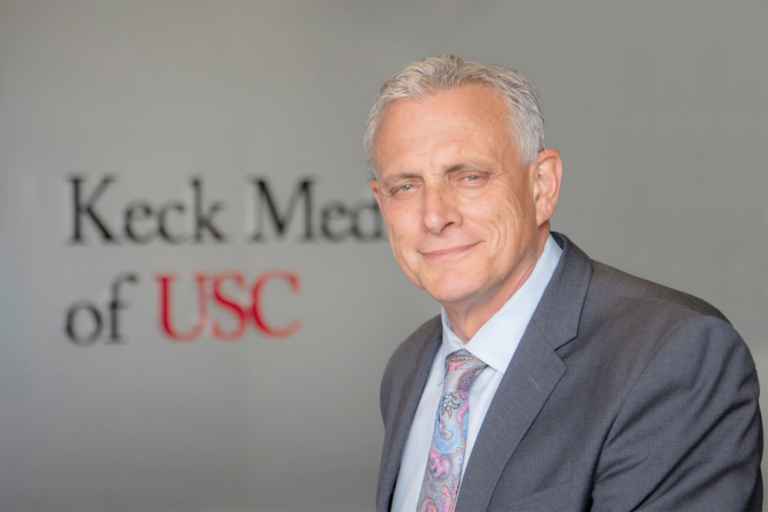
Steve Shapiro takes the macro view of medicine. This spring, he became the first senior vice president for health affairs at USC, where he will oversee — and build bridges between — clinical operations at Keck Medicine of USC and research and medical training at the Keck School of Medicine of USC.
Previously, he was executive vice president, chief medical officer, chief scientific officer and president of health services at the University of Pittsburgh Medical Center — all at the same time. USC News sat down with him recently to find out what makes him tick.
Were you interested in science when you were a little boy? Was there a doctor in your family?
No doctor in my family — my father was an accountant. All I really remember was a real passion for sports and maybe a general intellectual curiosity that’s served me well. But my father died way too early — when I was 13. And maybe the combination of that, finding out that I really did love science and wanting to help people in difficult times led me to become a doctor.
Is there a memorable experience from your time training to become a doctor that you’ve carried forward with you?
First of all, it is incredible how much detail from different cases you remember from a long time ago. Probably the most memorable patient experience was right after my training. I was the attending physician in the ICU — attending means the buck stops with you — and there was a patient who was flown to our ICU, 23 years old, on maximum ventilatory support and hemodynamic support.
We really had no expectations that she would survive, and that was before one of the residents accidentally punctured her lung while putting in a venous line. I remember wheeling the patient quickly to the operating room where a surgeon and anesthesiologist really saved her. Eventually, the patient walked out of the hospital.
What lesson did you take away from that?
A really bad lesson! I now thought I was a super doc who could save everyone. Over time, I learned the painful lesson that sometimes doing everything to ‘save’ a patient is actually prolonging death. It’s a critical skill that one has to learn in the ICU: when to be aggressive and when to back off and let someone die in dignity.
You’ve been a researcher focused on molecular pathways of inflammation and tissue destruction in lung disease. What do you like about academic medicine?
It is really rewarding as a doctor to be able to decipher patients’ underlying illnesses and help them get better. It is even more exciting to see the underlying molecular and cellular abnormalities and really try to unravel disease mechanisms and develop therapies to help lots of people. As an educator, it’s satisfying to teach the next generation of doctors and health science leaders.
What drew you to the administrative side of medicine?
I still love doing medicine. I love research. But the more I was pushed toward leadership positions, the more important I saw American health care in general. Until recently, as chief medical officer at the University of Pittsburgh Medical Center, I still saw a mixture of patients and had a small lab. But I realized that, in a way, those were guilty pleasures and I should be spending my time making sure everyone else is successful.
What is exciting about this new job and being in Los Angeles?
It’s one thing to be able to build the largest academic health care system starting in Pittsburgh and growing northeast. But I really wanted to see if I could take these skills and help Keck apply them to one of the most important and diverse cities in the country with, by far, the most complex health care market.
Health care is really at a dynamic inflection point, and few places are going to navigate it and thrive. With our relationships with Los Angeles County+USC Medical Center and Children’s Hospital Los Angeles, USC and Keck can really be the role model for health equity in the country.
You’ve said that L.A. traffic will give you more time for audiobooks. Any recommendations, audio or otherwise?
I’ve just finished a couple of books. One was called Broken, Bankrupt and Dying by our chief medical officer at LAC+USC, Brad Spellberg. It’s the best argument I’ve heard for a single-payer system, as well as explaining the nuances of what single-payer means. It’s really impressive.
I’m just starting The Intuitionist by Colson Whitehead. I’ve read his other books more recently. This was his first book.
Tell us about your family.
My wife is the smartest person I’ve ever met, and she and our five daughters really keep me humble and inspire me to be a champion for women’s issues. One’s a software engineer in New York, one’s a health care lawyer in the Senate in D.C. and we have three teens/preteens here with us. The kids really like going to the beach. Though, truth be told, they like going shopping in beach towns.
Moving from Pittsburgh to L.A., was there a moment of culture shock?
I grew up in Chicago, another big city. Even when I step back and look at all the unsolved challenges we have in Los Angeles, I find I’m really enjoying it here.
